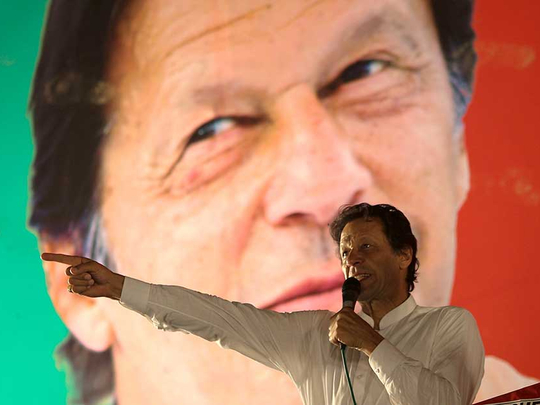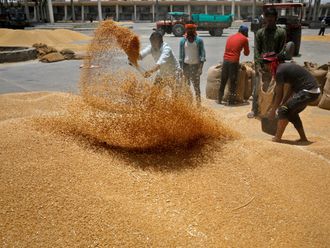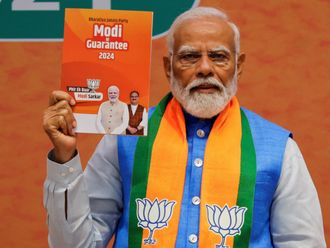
Comment:
The Indian subcontinent is well known for grown men displaying public affection. The outrage at the irrepressible former cricketer turned politician Navjot Singh Sidhu hugging Pakistan army chief Qamar Javed Bajwa at Imran Khan’s swearing-in as Pakistan’s prime minister was a storm in a tea cup.
Former Indian cricket-star-turned-politician Navjot Singh Sidhu hugs Pakistan's Chief of Army Staff (COAS) General Qamar Javed Bajwa at Prime Minister Imran Khan's oath-taking ceremony
Modi had given his usual bear hug reserved for foreign dignitaries to Sharif and walked around holding his hand. Subsequently, the Pathankot Air Force base was attacked within a month on January 2, 2016 and incredibly, the Modi government gave Pakistan’s ISI access to it base.
Nationalist media channels bayed for Sidhu’s blood, with one particularly impassioned cheerleader tweeting “Lanat” (shame) for the Sidhu hug. Surprisingly, Sidhu’s boss and Punjab Chief Minister Amrinder Singh also delivered a public rebuke. Singh’s attack on Sidhu and the counter attack by Sidhu caused the Congress party endless blushes.
There was confused reaction by India subsequently on August 18. Modi wrote a letter to Khan calling for “meaningful and constructive engagement”. Khan responded publicly by saying the “best way to alleviate poverty and uplift the people of the subcontinent was to resolve the differences through dialogue and start trading”. Khan did not address Modi’s point that the “Indian subcontinent should be made free of terror and violence”, a key concern for New Delhi.
To move forward Pakistan and India must dialogue and resolve their conflicts incl Kashmir: The best way to alleviate poverty and uplift the people of the subcontinent is to resolve our differences through dialogue and start trading https://t.co/V2UkXp0WwS
— Imran Khan (@ImranKhanPTI) August 21, 2018
Khan is known to every cricket loving Indian as the most successful captain of Pakistan and possibly one of the handsomest cricket stars. While this makes Khan, who was earlier a frequent visitor to India, extremely familiar, his politics is an unknown quantity.
The Imran Khan version 2.0 in his political avatar is something the Indian foreign office is wary of. The huge curiosity is matched by huge trepidation. Khan’s predecessors in office, Benazir Bhutto, Sharif and Pervez Musharraf, were known entities, but Modi’s 'New India' is still sizing up Khan’s 'Naya Pakistan'.
Khan earlier said he knows and understands India well because of his cricketing excursions and his status as the heartthrob of a certain generation of the subcontinent. He has not put a wrong foot forward ever since he assumed office, inviting his old cricketing pals for his swearing-in though Sunil Gavaskar and Kapil Dev declined. Even when Sidhu was attacked in India, Khan immediately leapt to his defence saying he was working for peace.
I want to thank Sidhu for coming to Pakistan for my oath taking. He was an ambassador of peace & was given amazing love & affection by ppl of Pakistan. Those in India who targeted him are doing a gt disservice to peace in the subcontinent - without peace our ppl cannot progress
— Imran Khan (@ImranKhanPTI) August 21, 2018
Khan has also publicly offered help to India in the devastating Kerala floods and said that he sends “prayers and best wishes”. This sort of outreach should be met with a similar tack from India for the good of the vexed relationship.
On behalf of the people of Pakistan, we send our prayers and best wishes to those who have been devastated by the floods in Kerala, India. We stand ready to provide any humanitarian assistance that may be needed.
— Imran Khan (@ImranKhanPTI) August 23, 2018
Khan, says an Indian diplomat who has known him since his Oxford blues stint, is a natural leader “decisive and clear. Once he’s taken the call then nothing is likely to change it. He was the same in cricket. But what most people don’t understand is that cricket is a team game not a solitary pursuit and Khan made the team excel.”
The relationship with Pakistan is always India’s biggest preoccupation in terms of foreign policy. Till date, the two governments, led by the BJP – one by late Atal Behari Vajpayee and currently by Modi – have always had the space to negotiate an imaginative outreach. Vajpayee travelled on a bus to Lahore and hosted Musharraf in Agra. Modi’s cross-border dash and the sari sent by Sharif for his mother would have been impossible by his predecessor Manmohan Singh, who was ardent in his pursuit of peace and yet was not able to carry people along for his outreach to Pakistan.
Vajpayee’s visit to the Minar-e-Pakistan and his humane approach to Jammu and Kashmir where he said he was committed to “insaniyat, Jamhooriyat and Kashmiriyat” had a transformative effect on the matter. Vajpayee was also hailed in Pakistan till the Kargil misadventure destroyed all hope.
2002 - Pakistan President General Pervez Musharraf shakes hands with Indian Prime Minister Atal Bihari Vajpayee during the inaugural session of the Saarc Summit in Kathmandu - Archives
Modi has tried to emulate Vajpayee. He invited the leaders of India’s neighbouring countries to his swearing-in in May 2014 and that famous visit to Sharif. However, post Pathankot, Modi seemed to lose interest in getting ties back on track. Modi has now veered back to Vajpayee’s line in Jammu and Kashmir after the hard line dictated by the Rashtriya Swayamsevak Sangh and its point person, Ram Madhav, flopped. The crash and burn of the unlikely alliance of the BJP with the People’s Democratic Party in Jammu and Kashmir with Mehbooba Mufti as the chief minister has much to do with the new Modi line.
Unfortunately Khan has taken over as India gets in to the countdown for the 2019 general election and the BJP into its default mode of flag-waving hyper-nationalism. This ensures that Modi, in any case in permanent campaign mode, will tread cautiously on India’s most important bilateral relationship.
The big theatrical headline grabbing outreach will be missing. Even the Indian foreign office will advise caution as elections are due in seven months and Modi is now effectively a caretaker government.
This may actually be providential for the relationship between India and Pakistan as it will give Khan a chance to settle into office and work out his domestic equations with the most critical factor – the Pakistan army. Says an old Pakistan hand in the foreign office “our relationship with Pakistan was always governed by the A’s – America and the Army. America is out of the picture with Donald Trump in office and has been replaced by China. The other we still have to navigate.” China is a key factor now and Khan is likely to make this relationship a priority and make his first foreign visit to Beijing.
If Modi comes back for a second term then it will be a quick back to business – possibly with talks and a cricket series. But a new prime minister could recalibrate the tricky relationship.
Swati Chaturvedi’s book “I am a Troll - Inside the BJP’s secret digital army” has received international acclaim. Her twitter handle is @Bainjal.












